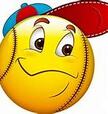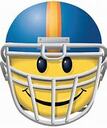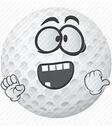
Every profession has its own language where the words and phrases describe certain activities and situations. Sports are no exception. These words and phrases are used by the athletes who play, coaches, announcers, and fans ‒ those involved in the sport. However, a sports clichés described by those people are overused descriptions of those activities and situations related to that sport ‒ more in the nature of buzz words.
Take a look at what the “experts” claim as language unique to their sport. Don’t be surprised to see duplications. Can you identify which came first…the general language cliché or the sports terminology?

The Washington Post, not too long ago, studied nearly 7,000 baseball interviews conducted over a time span of twenty years and complied a comprehensive list of what they called baseball clichés. The phrase “we gotta play ’em one day at a time” was used 485 times and “tip your cap”, over 300 times. If you think about it, out of 7000 conversations, these numbers are actually rather small.
The first recorded use of this phase is believed to be from Ralph Carpenter in the newspaper Dallas Morning News, March 1976. To give context for the following quote, a basketball game was being played and the score was tied.
● “Stepping up to the plate”
This phrase tells the batter to step up to home plate and prepare to bat the ball. From the late 1900s on it was frequently transferred to other enterprises, especially business, politics, and other sports even though they don’t use “plates”.
● “Rub some dirt on it”
This origins of this phrase are claimed by both baseball and football. Some claim in comes from very old medical advice. I hope they're wrong.
● “Three strikes and you’re out. ● “It ain’t over ’til it’s over”
● “Grab some bench” ● “Going, going, gone”
● “Ducks on the pond” ● “Back against the wall”
● “A Grand Slam” ● “Kiss that one goodbye”
● “He crushed it” ● “He sent that one into orbit”
● “He tattooed that one ● “He was caught napping”
● “He wishes he could have that one back.”

American Football resulted from several major divergences from soccer and rugby, most notably the rule changes were instituted by a Yale University athlete and coach, Walter Camp, considered the "Father of American Football".
The so-called Football clichés sound more like existing clichés and terminology that have been adapted to football, rather than originating first as football language. But that’s just my impression.
● “We have to come together as a team.” ● “There’s no “I” in team.”
● “He knows what it takes to win.” ● “He just knows how to win”
● "The game will be won in the trenches" ● "We need to air it out"
● “He has a motor that doesn't quit" ● “Too good to go down”
● “He gave 110% / he worked his socks off ● “Bad time to concede”
● "The defense is flying around with their ears pinned back"

Basketball was invented by James Naismith on or about December 1. 1891, at the International Young Men’s Christian Association (YMCA) Training School, Springfield, Massachusetts, where Naismith was an instructor in physical education. Basketball is the only major sport strictly of U.S. origin.
● “A defense that bends but doesn’t break.” ● “Take care of the ball.”
● “We left it all on the court” ● “He’s playing his game.”
● “They’re playing within themselves.” ● “It’s a marathon, not a sprint.”
● “He always gives 110%.” ● “They've been ice-cold.”
● “They play above the rim.”. ● “It's raining threes.”
● “They're shooting the lights out.” ● “He can fill it up.”
● “He's automatic.” ● “He can really dish the rock.”
● “He has the hot hand.”
● “The winner can punch their ticket to The Dance.”

The origins of the sport of golf are still widely debated, but it is generally acknowledges that the modern version of golf developed in Scotland from the middle ages onwards.
Golf did not become popular internationally until the late 19th century, when it spread into the rest of the British Empire and to the United States. Now it is one of the favorite social sports.
● “Fore!”
"Fore" is a word of warning yelled by a golfer who hits an errant shot. If your shot is in danger of hitting or landing very close to another golfer or group of players on the golf course, you should yell "fore!"
● “Drive for show and putt for dough.”
Putting is the difference between winning and losing on the major tours and this is probably how and why this golf term originated.
● “Never up, never in”
This is another one for the award of ‘captain obvious’ clichés that gets commonly heard around golf courses. It gets said when a golfer leaves a putt short of the hole that appears to be right on line.
● “That will bring rain”
● "It's pure golf."
● "You've got to know where to miss it."
Tour pros and average golfers both trot this one out often -- their way of saying it's taken them years of painstaking study to discover you don't want to hit your ball into one of the ponds.

● “Caught sleeping
Usually used when a player has made a silly or foolish mistake that could have been entirely, easily avoidable.
● “Class act”
A phrase used in soccer to describe players or figures who have done something respectable or remarkable, on or off the pitch.
● “Clean sheet”
When a team manages to not concede a single goal for the duration of the match.
● “Consolation”
A late goal in a loss that won’t change the score is a consolation goal.
● “Early doors”
Used by commentators to describe the opening stages of the game. For example, 'It’s just gone 10 minutes so it’s still early doors.'
● “End-to-end stuff”
Describing a match that is so action-packed and engrossing that it’s impossible to take your eyes off of it.
● “Hairdryer treatment”
This is Sir Alex Ferguson’s preferred post-match tactic. The legendary Scotsman would yell at his players mercilessly in the dressing room in order to motivate them – acting as the ‘hairdryer’ in this analogy.
● “In his pocket”
When a player has dominated their marked target for the duration of the game, usually used for defenders marking their forward counterparts.
● “Kill the game”
Used when a goal is scored to define the score line of the game and put an end to it.
● “Lost the dressing room”
When a manager or key figure in the team has lost the backing of the team or coaching staff.
● “Park the bus”
A favored tactic which involves setting up your entire team in a defensive shape in order to tire out opponents and preserve the clean sheet.
● “Couldn’t Hit A Cow's Backside With A Banjo"
This particular phrase relates directly to those players whose job it is to find the back of the net.
● "Got The Bottle"
If someone does or does not have the bottle, it means that will they stand up to a high pressured scenario.
● "Stepping Up To The Plate"
This means that no matter what side of the bed a player falls out of, it is up to them to give 110% when they step on to the hallowed turf.
●"Putting In a Shift"
A player can often turn in a great performance but if they have gone above and beyond the call of duty then this is referred to at times as putting in a shift.
● "Into the mix”
When games are tense and run into overtime, teams often launch the ball into the 18 yard box. This is done for a host of reasons but ultimately, it is to force the issue of trying to score. This is often referred to by commentators as putting the ball “into the mix.”
● "Not Over Till The Fat Lady Sings"
Under normal circumstances, it is down to the referee to call a game to an end. Yet, as many commentators know, the match is definitely not over until the fat lady sings. This phrase is one of the most common used and has been utilized in numerous situations by numerous sports.
● "Onion Bag"
Another phrase for the goal, the onion bag has often been spoken about by a wealth of commentators around the globe. But the onion bag signifies a bulging net full of not vegetables but footballs. It is believed that the onion bag originated back because goal nets were previously made from an onion bag, or so the rumor goes.

For those you who aren’t boxing fans, the “Sweet Science” is the term used for sport of pugilism.
British sportswriter Pierce Egan called boxing the ‘sweet science’ in 1813 since it is a sport that requires fighters to be tactical and scientific in their approach. The term is still used today by many fighters and analysts. A modern example of a boxer that exemplifies the essence of the sweet science is Floyd Mayweather Jr.
Mayweather is methodical, and uses his left jab to break his opponents down. He is the master of defensive boxing. He is a safety first fighter that sticks to his game plan to ensure victory. His record is 50 fights fought, fifty fights won. Looks like the strategy works.
This sport brings to the table many terms, metaphors, and clichés used by many people, whether or not they know where the words came from.
● “Beat someone to the punch”
The cliché means throwing the first punch before your opponent can. This boxing sense is from 1913 while the figurative meaning came about just couple of years later.
● “Below the belt”
This term, meaning unfair, comes from the unfair and illegal boxing maneuver of hitting someone in the nether regions. The phrase gained its figurative meaning around 1889.
● “Blow by Blow”
This term relates to a very detailed description of a boxing match and was originally used starting in the early 1920s. By the 1940s, blow-by-blow was being used in a non-boxing sense, perhaps first by mystery writer Hilda Lawrence in her novel Death of a Doll: "Maybe we'd better get together. Blow by blow description."
● “Glutton for punishment”
Glutton meaning an enthusiast for something—a glutton for books, for example—has been in use since the early 1700s. However, the phrase glutton for punishment, one who refuses to leave a losing situation, is a mid-1800s term that comes from pugilism.
● “Groggy”
The word we know as meaning sleepy or out of it originally meant “intoxicated,” and came from grog, an old-time alcoholic beverage. Groggy meaning “dazed” is from the boxing ring, meaning weakened in a fight, hence staggering, shaky, and unsteady.
● “Killer instinct”
Killer instinct was first used to describe American prize fighter Jack Dempsey in the early 1930s. Now the term refers the drive to succeed in anything and at any cost.
● “On the ropes”
When a fighter is pushed up against the ropes of the boxing ring by his opponent, he’s in big trouble. Hence, the figurative meaning of on the ropes is being near defeat or in poor condition.
● “Palooka”
The word palooka originally referred to a mediocre prizefighter. The prizefighter sense originated around 1926, and is credited to Jack Conway, the editor of Variety magazine. Joe Palooka was a 1920s comic that featured a dim-witted boxer with a heart of gold, which helped popularize the “oafishness” connotation of the word.
● “Pluck”
In late 18th century pugilism slang, a brave fighter was said to have pluck. Pluck earlier referred to the heart and entrails of a slaughtered animal, or that which could be “plucked” from a carcass. The figurative sense in fighting was that of courage, which at the time was believed to reside in the heart.
●.”Punch-Drunk”
This term meaning dazed and confused originated in boxing parlance referring to a fighter stupefied by too many punches to the head. Later, punch-drunk came to mean a neurological condition seen often in boxers and formally known as chronic traumatic encephalopathy.
● “Roll with the punches”
Originally, to roll or ride with the punches, or to adapt easily to adverse circumstances, comes from the fighting maneuver of moving or rolling one’s head and body away from a blow to lessen its impact. Now it’s used to mean go along with what happenes. Go with the flow.
● “saved by the bell”
Saved by the bell is an idiom meaning to be rescued at the last moment from a sticky situation, usually by a stroke of good luck. While there’s a wide-held belief that the origin of the phrase has to do with a 17th-century fear of being buried alive and subsequent coffins equipped with bells to save any such unlucky individuals, it’s actually—you guessed it—a boxing term referring to a losing fighter being “saved” by a bell that signals the end of a round.
● “throw in the towel”
To throw in the towel, or give up, came from the early 20th-century boxing practice of literally throwing a white towel into the ring when admitting defeat. This convention comes from an earlier one of throwing up a sponge to admit defeat, hence another giving-up phrase, “to throw (or chuck) up the sponge.”
● “throw one's hat in the ring”
While throwing in the towel signifies giving up, throwing one’s hat in the ring shows you’re ready for a fight. This custom is from at least the early 1800s, a time when most men wore hats, and would have been more reliable than trying to make yourself heard over a noisy, fight-thirsty crowd.
● “bare-knuckle”
This means fierce or determined (from boxing done without gloves).
● “come out fighting/swinging”
The term means the boxer should be immediately aggressive or energetic.

That makes sense. Pugilism in some form has been around since the 3rd millennium BC. The earliest appearance of boxing in history comes from Sumerian artifacts found in Iraq. Other evidence has been found in Assyria and Babylonia. Later, the sport moved on to Greece and Rome.
Modern boxing was introduced by Jack Broughton, a bare-knuckle boxing champion, with boxing’s first set of rules for modern times, and many of these are present in ever rules used today.
Given the history, it is not surprising that the sport terminology evolved before it was absorbed into the English language as metaphors and clichés.
JUST SAYIN
■
Sources:
https://www.mentalfloss.com/article/63958/15-common-phrases-come-boxing#:~:text=15%20Common%20Phrases%20that%20Come%20from%20Boxing%201,...%206%20KILLER%20INSTINCT.%20...%20More%20items...%20
https://www.theboxingplanet.com/why-is-boxing-called-the-sweet-science/#:~:text=Boxing%20is%20called%20the%20sweet%20science%20because%20it,1813%20by%20British%20journalist%20and%20sportswriter%20Pierce%20Egan.
https://rotisserieduck.com/2018/09/07/baseball-cliches-good-bad/
https://www.sportsfeelgoodstories.com/sports-cliches/#:~:text=%EE%80%80Basketball%EE%80%81%2
https://en.wikipedia.org/wiki/Origins_of_baseball
https://evolve-mma.com/blog/the-history-and-origins-of-boxing/#:~:text=The%20earliest%20appearance%20of%20boxing%20in%20history%20comes,wrapped%20fists%20for%20the%20first%20time%20in%20sport.
https://sportslens.com/football-cliches/86789/#:~:text=The%20https://www.dailywritingtips.com/55-boxing-idioms/12%20most%20annoying%20football%20clich%C3%A9s%201.%20Football,player%2C%20and%20almost...%203.%20A%20great%20advert%20
https://247sports.com/college/byu/LongFormArticle/College-football-cliches-byu-football-2021-season-projection-167967562/#167967562_8
https://www.dailywritingtips.com/55-boxing-idioms/
https://www.sporcle.com/games/Rocky123/basketball-cliches
https://www.sportsfeelgoodstories.com/sports-cliches/#:~:text=%EE%80%80Basketball%EE%80%81%2
https://www.sportsfeelgoodstories.com/sports-cliches/#:~:text=%EE%80%80Basketball%EE%80%81%2
https://hittingitsolid.com/blog/golf-cliches/
http://www.sportscliche.com/basketball.html
https://hittingitsolid.com/blog/golf-cliches/
https://www.goal.com/en-us/news/soccers-slang-cliches-idioms-explained-what-do-they-mean/io4qmsxgr1j516fthrel36lvh
https://www.britannica.com/sports/basketball
https://en.wikipedia.org/wiki/History_of_golf
□
 RSS Feed
RSS Feed